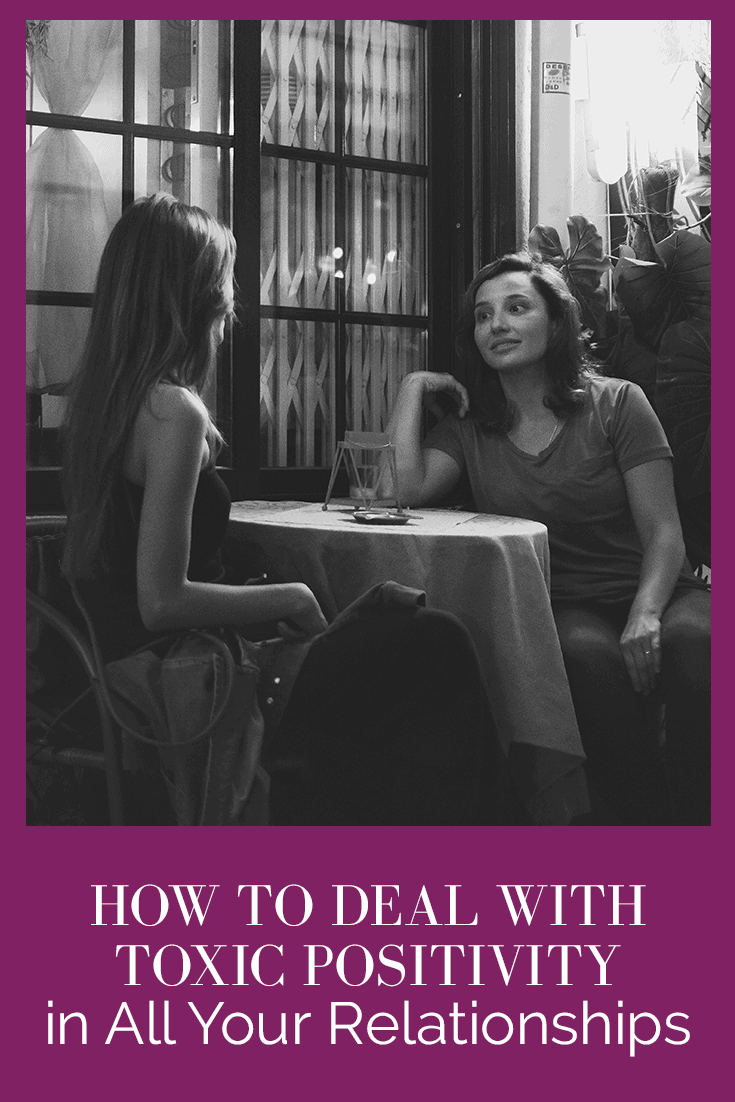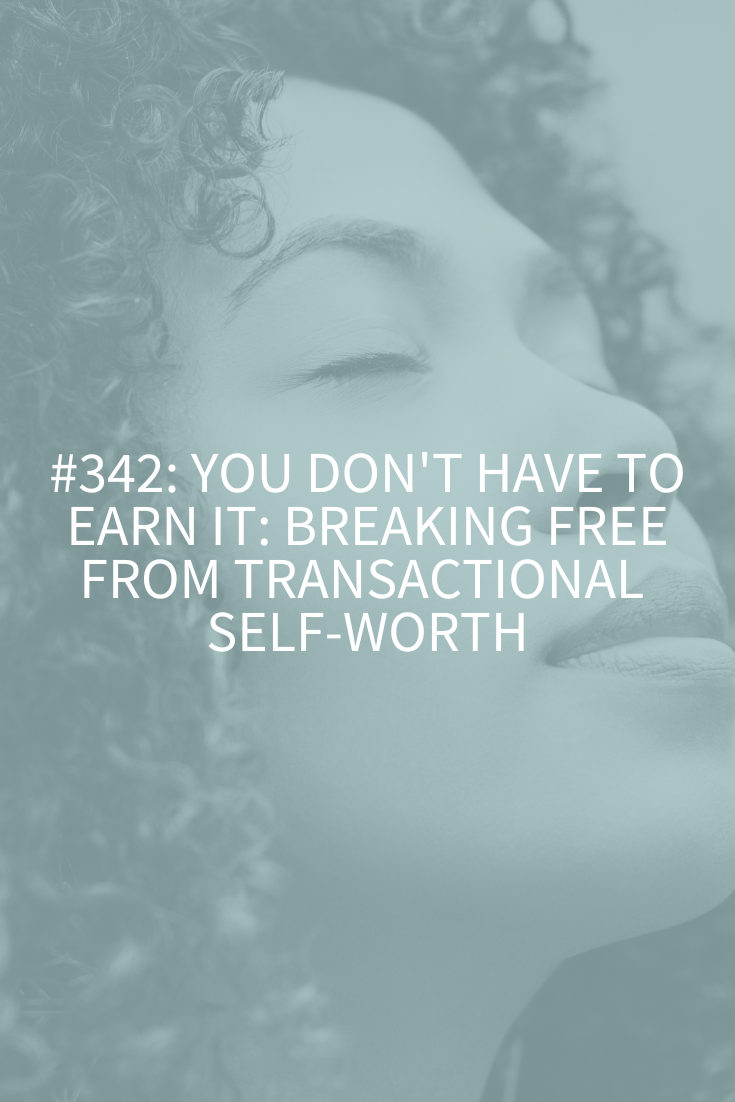
7-minute read
Prefer to listen to the podcast? Click here!
Do you feel pressure from your partner to be happy or “get over it” when you’re struggling? Does your best friend dismiss or minimize your difficult feelings? When you’re hurt, does your mom say, “You should be grateful” or “Look on the bright side?” You might be dealing with toxic positivity that leaves you feeling resentful, guilty or even ashamed, but I’m here to help with my not-so-secret secret to turning these relationships around so you can feel heard and truly cared for!
What is Toxic Positivity?
Here’s my favorite explanation of toxic positivity from Dr. Natalie Dattilo, a clinical health psychologist with Brigham and Women’s Hospital in Boston. She says: “Think of it as having a few too many scoops of ice cream. It’s really good and it makes us feel better, but you can overdo it, then, it makes us sick.” She then says to then think of “Trying to shove ice cream into somebody’s face when they don’t feel like having ice cream. That’s not really going to make them feel better.”
It’s the belief that no matter how horrible or difficult a situation is, you should have a positive attitude or mindset. It’s when someone only sees or acknowledges the good in any situation and makes no room for negative or unwanted emotions. Basically, it’s an unhealthy approach to positive thinking.
Now, if you listen to the podcast, follow me on Instagram or watch my YouTube videos, you know I’m all about the power of learning to be more optimistic and thinking more positively! I can trot out tons of studies about how thinking more positively can reduce anxiety, make your relationships happier and more stable, bring you more success at work, and even help you live longer!
However, all your feelings are important and need to be acknowledged, not just the so-called positive ones. True positive thinking and optimism come from love-based thoughts and emotions such as confidence, self-esteem, openness, willingness, compassion and kindness, while toxic positivity comes from fear – pure and simple. And that’s the difference.
Toxic positivity is a defense mechanism. It’s deployed by people because they’re uncomfortable with difficult emotions and they’re avoiding them at all costs. Toxic positivity doesn’t feel good because it’s not coming from a place of love and generosity; it’s coming from a place of avoidance, anxiety and fear. You’re picking up on the other person’s true motivation and that’s why it doesn’t feel good!
A Little Caveat Before We Continue
I’m using the term “negative” emotions here because it’s hard to have a conversation without using that term. However, emotions are not positive and good or negative and bad. Emotions are just emotions.
There are unwanted emotions and unhealthy emotions for sure, but sadness, disappointment, frustration and worry aren’t bad or negative emotions. In the big picture, I teach my clients to think of all emotions as signals. They’re telling you something and it’s important to listen and ask yourself, “What is this emotion telling me?”
Why Does Someone Have Toxic Positivity?
Specifically, toxic positivity is an avoidance defense mechanism! The person is avoiding feeling certain feelings. They’re also avoiding vulnerability and a deeper emotional connection. This is not because they’re a horrible person but because they have their own pain.
Maybe my wife’s complaining about how exhausted she is. We’ve got two young kids at home, the pandemic to deal with and we’re all fried beyond belief. But, when she expresses her overwhelm, I unconsciously feel guilty and maybe even ashamed. Or maybe I assume she’s blaming me somehow. I might think: “I’m the bread winner and I’m not making enough money to hire help” or “It’s my job to protect her and I’m not if she’s unhappy.” These are all fear-based thoughts and emotions. I’m feeling very uncomfortable (and don’t even realize it). So, I respond by trying to make her happy (literally) but it’s like I’m shoving that ice cream in her face.
Maybe my kid is upset about something. I hate to see my kid in pain! If I’m a good mom, my kid would be happy! In my discomfort and guilt, I try to console but it’s actually minimizing their pain and making it worse. I might even say, “Shhhhh, it’s OK.” But it’s not OK to my kid so now they find it hard to trust me since I’m not seeing what’s real for them.
Maybe you recently had a loss and I’m your best friend. Maybe in the beginning I was really “there for you” but now it’s been a few months and you’re still talking about the loss. I’m uncomfortable with this. Maybe I feel like I can’t share good news with you. Maybe I don’t feel like a good friend because I don’t want to talk about it anymore. Maybe I think that if I were a good friend, you’d be over it by now. Whatever the reason, I start to minimize your feelings or cut you off when you talk about it because I’m uncomfortable but don’t realize it.
Is toxic positivity happening in one of your relationships? Here are some signs:
- You feel pressure from a loved one to be happy or “get over it” when you’re struggling
- Your loved one says things when you’re sad or angry and you experience guilt
- When you express more negative emotions you get shut down
- Conversations with your loved one end with you feeling like there’s something wrong with you for having your emotions.
- You find you need to hide any painful emotions you’re having when you’re around certain people
- When things are hard, the other person starts giving you platitudes like, “Turn that frown upside down,” “just stay positive,” “look on the bright side,” “everything happens for a reason” or “be grateful for what you have”
- Feeling dismissed when you share difficult feelings and being told in that moment, “Happiness is a choice”
- Having your feelings minimized by someone else: “I don’t know why you feel so bad about what your mom said. It wasn’t that big a deal.”
- When another person completely ignores problems or issues in your relationship
- When you walk away after a conversation with this person feeling invalidated, ignored, dismissed or shamed
What to Do!
Here’s my not-so-secret secret for how to deal with toxic positivity: You’re going to need to train your loved one how to be with you differently (you might want to start with having them read this blog)! This isn’t about taking care of the other person’s emotions. You’re hurting – this is about you. However, you’re going to need to train the other person to be there with you so really, this is making an investment in the relationship with this other person.
Step 1: Bring everyone to the here and now!
You need to be present in what you’re feeling and you want to start training the other person to also be present in what they’re feeling when you share your emotions. This is the piece that gets missed. Folks start with validation but the validation doesn’t feel “real” because it’s coming from fear (the other person’s discomfort) not love (knowing all is OK in the moment and there’s nothing to fear).
Ask, “How are they feeling right now?” You’re having x emotion, but how are they feeling?
Step 2: Listen and Validate
For you, I want you to normalize whatever difficult emotions you’re having. Everyone has them! It’s OK!
With the other person, let them know that now that they’re present with you in this moment, all you’re looking for is for them to listen and be in your shoes for a moment. It’s not about them understanding why you feel this way (that gets people into fix-it mode). It’s about understanding that you feel this way and you have every right to your feelings whether they agree or not.
Here are some supportive and validating statements to look/ask for:
- I’m here
- I hear you/I’m listening
- I love you no matter what
- That really sucks. Can I help in any way?
- We’re a team and I’ll help in any way I can
- You’re not alone in this. I know I can’t feel your feelings with you, but I’m right here next to you.
Other Things to Note:
- No SAC’ing. No offering suggestions, giving advice or criticizing
- If you feel impatience from your partner or mother to “move on” then stop and reset with here-and-now feelings. Then ask them to give you space and room for your feelings.
People with good mental health don’t think about their emotions as good or bad, they don’t judge their feelings, and they don’t avoid their emotions. Practicing being in the here and now with them, on both sides, will improve your relationships and create more emotional closeness.
RESOURCES
8 Rules for Giving Great Feedback
RESEARCH






